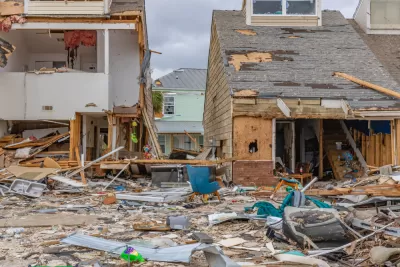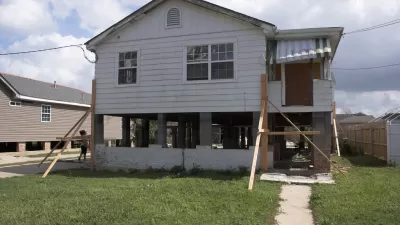Disaster preparedness efforts need to take into account that homeowners in vulnerable areas don’t take action even when the risks are clear.

"The conventional wisdom is that if people knew the threat they faced [from climate change] and believed measures to protect their home would work (and had the money to act) they’d do the logical thing and try to keep their family safe," writes Kate Yoder. But a study published in the journal Climatic Change reports that knowledge about climate change does not result in homeowners taking action to prepare for threats to their homes.
The researchers explored various reasons behind the lack of action by residents in New Hanover County in North Carolina, a coastal area hit hard by hurricanes, reports Yoder. "People do things all the time that they know are risky, like smoking cigarettes and driving cars. And when it comes to hurricanes, insurance and assistance from the Federal Emergency Management Agency might have lulled people into complacency, [Tracy] Kijewski-Correa said."
Various strategies can be used to counter the inaction, including the fostering of social norms, where residents model preparedness for others, and government mandates. Promoting the financial benefits of preparedness can also work, notes Yoder. "'Think about how many times [real-estate agents] show off the kitchen and the brand-new bathrooms,' Kijewski-Correa said. 'How many times do they the show off the roof that will actually keep your family alive in a hurricane?'"
FULL STORY: If facts don’t make you prepare for a hurricane, what does?

Planetizen Federal Action Tracker
A weekly monitor of how Trump’s orders and actions are impacting planners and planning in America.

Map: Where Senate Republicans Want to Sell Your Public Lands
For public land advocates, the Senate Republicans’ proposal to sell millions of acres of public land in the West is “the biggest fight of their careers.”

Restaurant Patios Were a Pandemic Win — Why Were They so Hard to Keep?
Social distancing requirements and changes in travel patterns prompted cities to pilot new uses for street and sidewalk space. Then it got complicated.

Platform Pilsner: Vancouver Transit Agency Releases... a Beer?
TransLink will receive a portion of every sale of the four-pack.

Toronto Weighs Cheaper Transit, Parking Hikes for Major Events
Special event rates would take effect during large festivals, sports games and concerts to ‘discourage driving, manage congestion and free up space for transit.”

Berlin to Consider Car-Free Zone Larger Than Manhattan
The area bound by the 22-mile Ringbahn would still allow 12 uses of a private automobile per year per person, and several other exemptions.
Urban Design for Planners 1: Software Tools
This six-course series explores essential urban design concepts using open source software and equips planners with the tools they need to participate fully in the urban design process.
Planning for Universal Design
Learn the tools for implementing Universal Design in planning regulations.
Heyer Gruel & Associates PA
JM Goldson LLC
Custer County Colorado
City of Camden Redevelopment Agency
City of Astoria
Transportation Research & Education Center (TREC) at Portland State University
Camden Redevelopment Agency
City of Claremont
Municipality of Princeton (NJ)





























